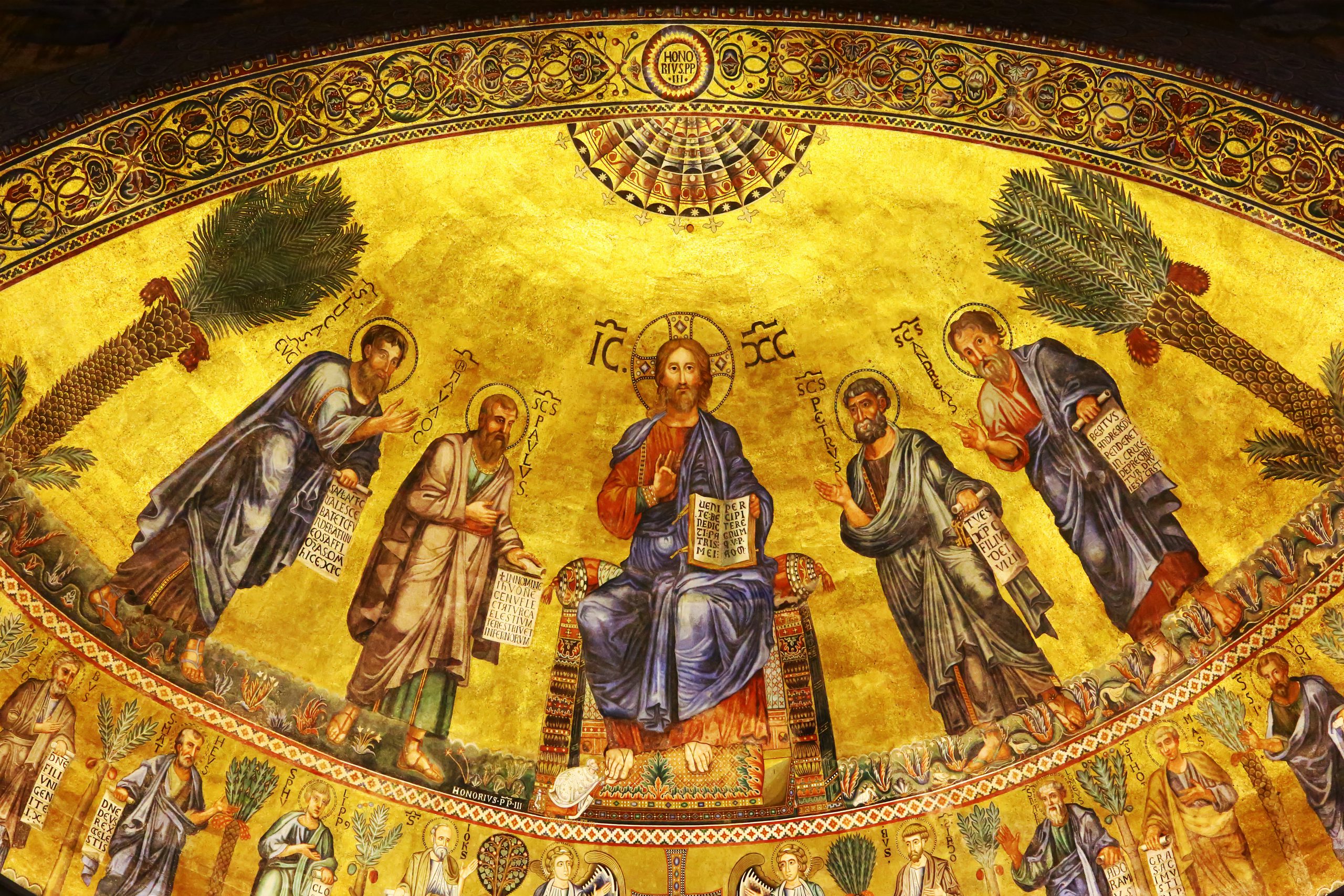
By Jake Geis
There’s no shortage of things people argue about nowadays, but one topic in particular that is sure to bring up serious division is what it means to be a man and to be masculine. These debates vary from lively, congenial discussions to outright venomous disputes. Somewhere within this banter there must be a legitimate answer.
Secular society has two schools of thought on masculinity. One says that a man should be domineering, commanding and subdue all under his feet. The other rejects that notion as toxic and espouses a passive, agreeable form of masculinity. In essence, one says man should be a brute, the other castrates the brute.
Start with the Creator
Monsignor Charles Mangan, associate professor at Mount Saint Mary’s University in Emmitsburg, Maryland, notes that the problem with any theory spun out of secular culture is it lacks the principal source of truth—God. Both camps may contain correct elements, but when they eliminate the One who is truth from their calculations, they both miss the mark. The correct answer lies only in turning to the source. If you want to understand a work of art, a book or an architectural wonder, you look to its creator. This means to define a man, you need to look to God.
“The Church does not have a singular, definitive document on what it means to be masculine,” Monsignor Mangan points out. “However, in turning to the ‘Theology of the Body’ (St. John Paul II’s series of teachings that shed light on this topic), we can come to see the plan God has for all of his children, both male and female.”

God created humans in his image and likeness, but two sexes—men and women. They do not oppose each other because they are both human. They can create life, which is one way that they are “like” God. They can’t do this on their own, but rely on the complementary aspects of the other’s biology to bring forth new life.
“Looking to the marital act, we see that the man gives, while the woman receives,” Monsignor Mangan says. “In this, we can see that the man’s role is active and to initiate. The woman then takes the gift and nurtures it in a way of which the man is incapable.”
As this complementarity is due to God’s plan and intention, it points to many other complementary attributes that are innate to the individual sexes. But the fall of Adam and Eve distorted our complementary roles; instead of complementing each other in total self-giving love, men and women are now at odds, with each of us abdicating our roles. If, then, we want to know what it looks like to be truly masculine, we need to turn to one not affected by the fall. We find that person in Jesus Christ.
The perfect man
Jesus blazed a path that all men long to follow, though few have the guts to walk. The Gospels show how he made everything he did a sign of love for his Father and the people he encountered. In these actions, we see the guiding tenets of his life.
Jesus’ first priority was connecting with his Father. We know he spent ample time praying, because the Gospels not only record many of his prayers but how he is constantly being interrupted while in prayer. God strengthens men, therefore the more a man connects with God, the stronger he will be.
Yet, Jesus did not lock himself in a room or live permanently in the wilderness. He reached out to others and built connections and relationships with them. Primarily, he associated with a dozen men, his Apostles, and among them three in particular: Peter, James and John. He lived with them, ate with them, conversed with them, traveled with them—being part of that group was core to his public life. Through this, Jesus lived the principle that men make other men better as “iron sharpens iron” (Prv 27:17).
Yet among this group, Jesus wasn’t iron, but rather a diamond sharpening the others. He exhibited his leadership not through dominance, but servitude. He did the work others didn’t want to do, like washing feet. He spent hours on end teaching others, healing others and encouraging others. His life was outward focused, all the way to the Cross. Through his service, he engendered respect, which induced others to follow his leadership.
And he led without being a stone-faced stoic. Jesus is joyful and kind with those who society rejected, and compassionate towards the crowds who longed for a shepherd. His heart breaks at the death of his dear friend Lazarus, bringing him to tears. And he is stirred to anger at the desecration of his Father’s temple, driving out the money changers through the use of force.
But in this, his emotions do not dominate him. Rather, they are a motivator he uses to bring about the correct action. Though frustrated with the scribes and Pharisees, Jesus never raises his hand at them. His voice, yes, but the Prince of Heaven’s armies does not strike them down. Rather, he uses their hard-headed refusals as a tool to bring important points of theology to the fore, so others listening to the conversation can learn the truth and believe in him.
This discipline of mind over body extends to his final action. He subjects himself to brutal torture and humiliation to save the people who rejected him. To accomplish this goal, Jesus not only shows his physical toughness to tolerate pain, but his mental fortitude by enduring this, rather than call upon his Father and be released from it. He grits his teeth and suffers through it for our sake. Many guys like to claim they are as tough as nails, Jesus proved he was tougher than the iron slammed through his body.
Living out our calling as Catholic gentlemen
Jesus showed us a man should be prayerful and strive after the Father’s will. He should be a servant leader who associates closely with other good men. A man should feel his emotions, but be disciplined to use them as motivators rather than be dominated by them. And he needs to be tough, because this world is out to get him and those he loves. What does that look like in our lives today?

Father Paul Rutten, pastor of St. Mary and Christ the King parishes in Sioux Falls and St. John Paul II Parish in Harrisburg, believes this happens when men turn outward. “Men need to sacrifice self for the sake of others. A man that cannot do that is a boy. He needs to be discipled, active and willing to ‘hold the line’ in this world that is pushing against us.”
This is best exhibited in the home. “In our culture, men have passed the buck to their wives,” Father Rutten continued. “They’ve been told so many times that ‘anything a man can do, a woman can do better.’ Now they are believing it and abdicating their role as leaders.”
To list all the applications of this statement would be impractical. However, we can delve into some examples to illustrate how this may play out in your life.
It’s late at night and you’re exhausted after a long day. You are about to sit down and relax when you notice your wife is still finishing household chores. A boy flips on the TV and tunes her out. A man gets up and helps her, only stopping when all the work is through.
You walk into your son’s room to see he is watching a movie that’s inappropriate for his age. You tell him to turn it off and he starts complaining. A boy decides it’s not worth the fight and doesn’t want his son to “hate” him for ruining the fun. A man puts his foot down, knowing what’s best in the long run overrules the short-term discomfort.
You’re in college and you stayed out late Saturday night. Your alarm rings for you to go to Mass. A boy turns it off and skips Mass. A man gets out of bed and into the pew.
At the end of Mass, the priest lists a series of lay roles that need to be filled in the parish. A man volunteers for one that fits his abilities. A boy keeps his eyes down and hopes he doesn’t get called on.
In each example, a man puts others first or future benefits over immediate comfort, by exercising self-discipline. This is not our natural reaction due to the effects of the fall. But we grow in our ability to make the correct decision through connecting with God in prayer, who strengthens us. We also become stronger when we associate with other men who are growing towards God.
It’s easier to help your wife, stand up to your children or make it to Mass if your friends do likewise. Christ brings us together to grow as men, Satan wants us separate. If you wish to be a better man, find men to be the iron that you sharpen against. As Father Rutten says, “We (men) need to be called into manhood, but our modern culture lacks a ‘rite of passage’… Men need good role models and our culture doesn’t have them. Only a man can call a boy into manhood.”
Take up Christ’s yoke to walk as a man
Reading this list may seem like a tall order. But it is imperative to recognize that our strength to complete all these tasks comes not from ourselves, but from Christ.
Tony Kayser, a father, husband and leader from Holy Spirit Parish in Sioux Falls, sees the provider role as a fallacy. “As men, we think we are the provider, but we aren’t. God is; everything we have is a gift from God. Take that weight of being the money provider and give it to him.”
Instead, Tony feels a man’s role is that of a defender. “Men should focus on defending their family, Church and faith,” he says. “This is the leadership role we are called to, which is a mental shift from the provider mentality.” Through simply responding affirmatively to the little tasks God asks from us each day, our works can yield fruit 40, 60 or 100 fold.

This knowledge preserves us from a common problem for men today known as Atlas Syndrome, a term coined by psychiatrist Dr. Tim Cantopher. Men with Atlas Syndrome, like the Greek titan Atlas, feel the weight of the world on their shoulders. They believe if they can’t provide it all, everything will come crashing down.
Compare this to Christ’s yoke, which he tells us is light to bear. In Christ, we understand if everything we have is a gift, it’s not up to us to ensure there is enough. Rather, we are just called to say yes to whatever God asks us to do. If we do that, God will make sure we have what we need.
And we must recognize that failing in one moment is not the end. The effect of our fall makes that almost inevitable. Instead, we take our failures as opportunities to improve. Look to St. Peter—the first to profess Jesus as Lord and the first to deny knowing Jesus in his hour of need. He didn’t stay mired in his denial, but when he turned his will completely to God’s upon being filled with the Holy Spirit, he delivered the most fantastic homily on Pentecost Sunday, bringing 3,000 into the Body of Christ. It is not over when we falter, it is an opportunity to get up and try again.
The calling to all
Any attempt to define masculinity or femininity via this post-Christendom culture is futile. True masculinity and true femininity were victims of the fall of Adam and Eve, and all world cultures throughout the ages have had a skewed understanding of them as a result.
Christ came to restore our destiny, both male and female. Through his work of the Immaculate Conception, God created the only perfect example of femininity to walk with Jesus, the only perfect example of masculinity, that the fallen world will ever see. But through them, we can grow into our true masculine and feminine natures, with the full expression coming with the resurrection of our bodies at the end of time.
Men, that door is open for you now. It isn’t too late to accept the role of manhood: accepting its duties and celebrating its honors. Christ’s gaze is upon you, asking you to join him in the greatest battle in history. Will you rise to the challenge? Will you answer his call?


